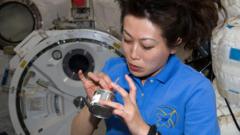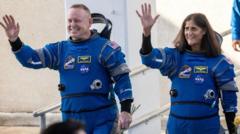A groundbreaking experiment launched today by the European Space Agency (ESA) marks a significant step in the quest to grow food in space. This initiative evaluates the feasibility of producing lab-grown food in low-gravity and high-radiation environments, aiming to reduce the staggering costs associated with feeding astronauts on missions.
### Growing Food in Space: An Innovative Step Towards Sustainable Space Travel

### Growing Food in Space: An Innovative Step Towards Sustainable Space Travel
European Space Agency's pioneering project explores lab-grown food production in space, potentially transforming astronaut diets.
The experiment, dubbed "Frontier Space," seeks to develop a small-scale food production plant aboard the International Space Station (ISS) within two years, driven by the necessity of long-term human presence on the Moon and beyond. Dr. Aqeel Shamsul, CEO of Frontier Space, affirmed the project’s importance, emphasizing the need for off-world manufacturing facilities to sustain human life in space.
The overarching goal is to create a sustainable food supply for astronauts, who currently face exorbitant food costs—up to £20,000 per day—when relying on space-faring food shipments. The ESA’s mission includes sending a compact bioreactor to assess whether the cellular production of proteins, fats, and carbohydrates can be replicated in orbit.
The biochemical process involves growing food elements in vitro, similar to current lab-grown chicken products already available on Earth. This innovative technique could not only solve the logistical challenges of feeding astronauts but also enhance their dietary options, thereby increasing their overall well-being during space missions.
Dr. Shamsul envisions a future where 3D printing technology can replicate a wide variety of meals on demand using lab-grown ingredients, providing much-needed variety in astronaut diets. Yet, the current pilot relies on simpler protein sources to kickstart the process while awaiting regulatory clearance for more complex food items.
The bioreactor, which has been sent into space via a SpaceX Falcon 9 rocket, is primed to supply critical data that will inform future research and the development of larger bioreactors designed for extensive food production in space. Meanwhile, culinary experts at Imperial College London, led by master chef Jakub Radzikowski, are already experimenting with recipes using earthy ingredients to prepare appetizing meals for astronauts.
Helen Sharman, the first British astronaut, praised the initiative, noting that lab-grown food could ultimately improve nutritional quality and help offset the common weight loss astronauts experience during missions due to limited food choices. The aspirations of such innovations not only promise to make space living more bearable but hail a new era of culinary possibilities in the cosmos.
With the data from today's experiments, researchers anticipate constructive advancements toward a sustainable, efficient, and enjoyable food supply for long-term space interactions.
The overarching goal is to create a sustainable food supply for astronauts, who currently face exorbitant food costs—up to £20,000 per day—when relying on space-faring food shipments. The ESA’s mission includes sending a compact bioreactor to assess whether the cellular production of proteins, fats, and carbohydrates can be replicated in orbit.
The biochemical process involves growing food elements in vitro, similar to current lab-grown chicken products already available on Earth. This innovative technique could not only solve the logistical challenges of feeding astronauts but also enhance their dietary options, thereby increasing their overall well-being during space missions.
Dr. Shamsul envisions a future where 3D printing technology can replicate a wide variety of meals on demand using lab-grown ingredients, providing much-needed variety in astronaut diets. Yet, the current pilot relies on simpler protein sources to kickstart the process while awaiting regulatory clearance for more complex food items.
The bioreactor, which has been sent into space via a SpaceX Falcon 9 rocket, is primed to supply critical data that will inform future research and the development of larger bioreactors designed for extensive food production in space. Meanwhile, culinary experts at Imperial College London, led by master chef Jakub Radzikowski, are already experimenting with recipes using earthy ingredients to prepare appetizing meals for astronauts.
Helen Sharman, the first British astronaut, praised the initiative, noting that lab-grown food could ultimately improve nutritional quality and help offset the common weight loss astronauts experience during missions due to limited food choices. The aspirations of such innovations not only promise to make space living more bearable but hail a new era of culinary possibilities in the cosmos.
With the data from today's experiments, researchers anticipate constructive advancements toward a sustainable, efficient, and enjoyable food supply for long-term space interactions.

















